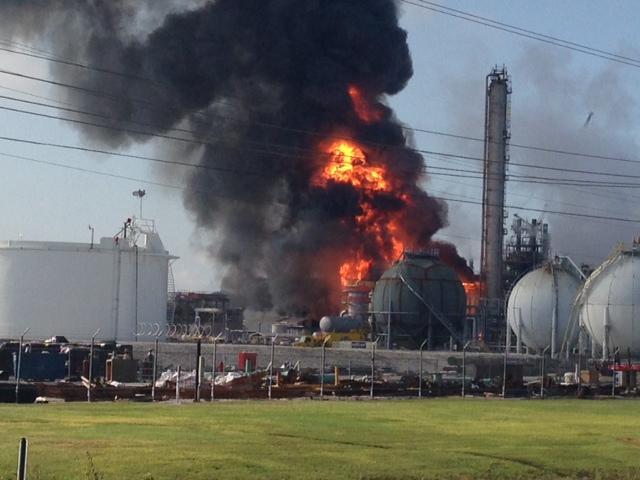(Source: WAFB)
What connects all of these events—the 1984 pesticide plant disaster at Bhopal, India; the Sept. 11, 2001, Al Qaeda attacks in the U.S.; and the recent deadly chemical plant explosions in West, Texas, and Geismar, Louisiana?
What connects these events is the looming danger of a terrorist assault or accident at a U.S. chemical plant.
In 2003, the government’s National Infrastructure Protection Center warned that chemical plants in the U.S. could be Qaeda targets. Media investigations have highlighted lax or nonexistent security at these facilities.
According to the Environmental Protection Agency, more than 470 chemical facilities in the U.S. each put 100,000 or more people at risk of a poison gas disaster. The Homeland Security Council projects that a major attack would set off a deadly gas cloud that would kill 17,500 people, seriously injure 10,000 more people, and send 100,000 more people to the hospital. In 2006, Senator Barack Obama called these hazards “stationary weapons of mass destruction spread all across the country.”
|
Hundreds of chemical facilities have switched to safer processes. Clorox Company has converted all of its U.S. facilities.
|
Lobbyists for the Koch brothers and other chemical-plant owners have prevented action on Capitol Hill to make these plants safer from attack or accident. President Obama has the power to make that happen, without Congress. He should act, right now.
A provision of the Clean Air Act, called the “general duty clause,” requires chemical plants to be designed and operated to prevent the catastrophic release of extremely hazardous chemicals. The EPA has the authority to issue new rules to implement this provision and require plants to improve safety—which would make them less vulnerable to attack.
In the wake of the 9-11 attacks, the EPA under Administrator Christine Todd Whitman drafted just such a proposal, but the Bush administration, under pressure from industry lobbyists, scuttled the plan. Now both Whitman and Obama’s recently-departed EPA chief, Lisa Jackson, are calling for the EPA to move ahead. So is a broad coalition of organizations, from the AFL-CIO to the NAACP, the Sierra Club to the environmental justice organizations that represent many people living close to dangerous chemical plants.
Safer cost-effective chemical processes are widely available. On August 1, after a sustained public campaign by a coalition of organizations, and critical public comments by members of Congress, the president took an important first step: He ordered a government review of safety and security procedures at chemical plants, resulting in a plan for action within nine months. If our citizens are to be truly protected, however, this plan must include strong rules to mandate the use of safer chemicals.
David Halperin served on the staff of the National Security Council. He is working with a coalition seeking new rules to make chemical plants safer.







0 Comments